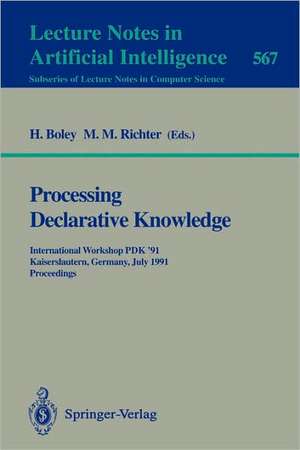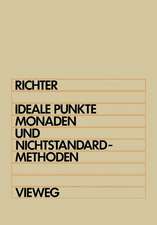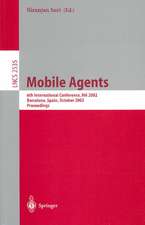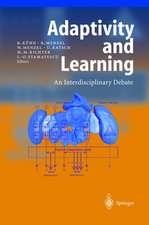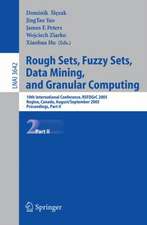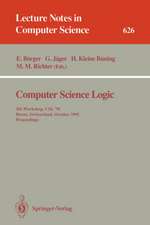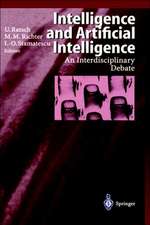Processing Declarative Knowledge: International Workshop PDK '91, Kaiserslautern, Germany, July 1-3, 1991. Proceedings: Lecture Notes in Computer Science, cartea 567
Editat de Harold Boley, Michael M. Richteren Limba Engleză Paperback – 4 dec 1991
Din seria Lecture Notes in Computer Science
- 20%
 Preț: 1061.55 lei
Preț: 1061.55 lei - 20%
 Preț: 307.71 lei
Preț: 307.71 lei - 20%
 Preț: 438.69 lei
Preț: 438.69 lei - 20%
 Preț: 645.28 lei
Preț: 645.28 lei -
 Preț: 410.88 lei
Preț: 410.88 lei - 15%
 Preț: 580.46 lei
Preț: 580.46 lei - 17%
 Preț: 427.22 lei
Preț: 427.22 lei - 20%
 Preț: 596.46 lei
Preț: 596.46 lei -
 Preț: 449.57 lei
Preț: 449.57 lei - 20%
 Preț: 353.50 lei
Preț: 353.50 lei - 20%
 Preț: 1414.79 lei
Preț: 1414.79 lei - 20%
 Preț: 309.90 lei
Preț: 309.90 lei - 20%
 Preț: 583.40 lei
Preț: 583.40 lei - 20%
 Preț: 1075.26 lei
Preț: 1075.26 lei - 20%
 Preț: 310.26 lei
Preț: 310.26 lei - 20%
 Preț: 655.02 lei
Preț: 655.02 lei - 20%
 Preț: 580.93 lei
Preț: 580.93 lei - 20%
 Preț: 340.32 lei
Preț: 340.32 lei - 18%
 Preț: 938.83 lei
Preț: 938.83 lei - 20%
 Preț: 591.51 lei
Preț: 591.51 lei - 15%
 Preț: 438.59 lei
Preț: 438.59 lei - 20%
 Preț: 337.00 lei
Preț: 337.00 lei -
 Preț: 389.48 lei
Preț: 389.48 lei - 20%
 Preț: 607.39 lei
Preț: 607.39 lei - 20%
 Preț: 1024.44 lei
Preț: 1024.44 lei - 20%
 Preț: 579.30 lei
Preț: 579.30 lei - 20%
 Preț: 763.23 lei
Preț: 763.23 lei - 20%
 Preț: 453.32 lei
Preț: 453.32 lei - 20%
 Preț: 575.48 lei
Preț: 575.48 lei - 20%
 Preț: 585.88 lei
Preț: 585.88 lei - 20%
 Preț: 825.93 lei
Preț: 825.93 lei - 20%
 Preț: 763.23 lei
Preț: 763.23 lei - 17%
 Preț: 360.19 lei
Preț: 360.19 lei - 20%
 Preț: 1183.14 lei
Preț: 1183.14 lei - 20%
 Preț: 340.32 lei
Preț: 340.32 lei - 20%
 Preț: 504.57 lei
Preț: 504.57 lei - 20%
 Preț: 369.12 lei
Preț: 369.12 lei - 20%
 Preț: 583.40 lei
Preț: 583.40 lei - 20%
 Preț: 343.62 lei
Preț: 343.62 lei - 20%
 Preț: 350.21 lei
Preț: 350.21 lei - 20%
 Preț: 764.89 lei
Preț: 764.89 lei - 20%
 Preț: 583.40 lei
Preț: 583.40 lei - 20%
 Preț: 649.49 lei
Preț: 649.49 lei - 20%
 Preț: 341.95 lei
Preț: 341.95 lei - 20%
 Preț: 238.01 lei
Preț: 238.01 lei - 20%
 Preț: 538.29 lei
Preț: 538.29 lei
Preț: 339.99 lei
Preț vechi: 424.99 lei
-20% Nou
Puncte Express: 510
Preț estimativ în valută:
65.06€ • 67.92$ • 53.84£
65.06€ • 67.92$ • 53.84£
Carte tipărită la comandă
Livrare economică 04-18 aprilie
Preluare comenzi: 021 569.72.76
Specificații
ISBN-13: 9783540550334
ISBN-10: 354055033X
Pagini: 452
Ilustrații: XII, 440 p.
Dimensiuni: 155 x 235 x 24 mm
Greutate: 0.63 kg
Ediția:1991
Editura: Springer Berlin, Heidelberg
Colecția Springer
Seriile Lecture Notes in Computer Science, Lecture Notes in Artificial Intelligence
Locul publicării:Berlin, Heidelberg, Germany
ISBN-10: 354055033X
Pagini: 452
Ilustrații: XII, 440 p.
Dimensiuni: 155 x 235 x 24 mm
Greutate: 0.63 kg
Ediția:1991
Editura: Springer Berlin, Heidelberg
Colecția Springer
Seriile Lecture Notes in Computer Science, Lecture Notes in Artificial Intelligence
Locul publicării:Berlin, Heidelberg, Germany
Public țintă
ResearchCuprins
Efficient processing of declarative rule-based languages for Databases.- Has dedicated hardware for Prolog a future ?.- Commercial applications of large Prolog knowledge bases.- Compiling conceptual graphs.- Subsumption in knowledge graphs.- A terminological knowledge representation system with complete inference algorithms.- An introduction to dynamic concept systems.- Querying concept-based knowledge bases.- Subsumption computation in an object-oriented data model.- A concise presentation of ITL.- Distributed disjunctions for LIFE.- Reasoning with maximal time intervals.- Nonclassical models for logic programs.- Logical operational semantics of Parlog part I: And-Parallelism.- A tool for building connectionist-like networks based on term unification.- Providing declarative access to a processing system for satellite image data.- Declarative functionality descriptions of interactive reasoning modules.- Rule-aided constraint resolution in Laure.- Flang: A functional-logic language.- Processing functional definitions as declarative knowledge: A reduced bytecode implementation of a functional logic machine.- Reducing scheduling overheads for concurrent logic programs.- A general framework for knowledge compilation.- Data-driven transformation of meta-interpreters: A sketch.- Improving the efficiency of constraint logic programming languages by deriving specialized versions.- Parallelizing Prolog on shared-memory multiprocessors.- Processing abductive reasoning via Contextual Logic Programming.- Efficient implementation of narrowing and rewriting.- Tim: The toulouse inference machine for non-classical logic programming.- Declarative and procedural paradigms-do they really compete?.- The GCLA II programming language.- A brief description of the PROTOS-L system.- PCPL — PROLOG constraint processing library version 2.0.- A mini-description of the ITL system.- Taxon: A concept language with concrete domains.- The ALF system: An efficient implementation of a functional logic language.- Transforming horn clauses for forward reasoning.- Implementation of the functional-logic language flang.- SEPIA 3.0 — An extensible prolog system.- FIDO: Exploring finite domain consistency techniques in logic programming.
